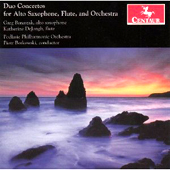
COLLECTIONS

1) David Morgan - Reflections and Meditations, for Alto Saxophone, Flute and Orchestra (2010)
2) Arthur Honegger - Concerto da Camera, Opus 188, for Alto Saxophone, Flute and String Orchestra (1948)
3) Pawel Lukaszewski - Trinity Concerto, for Alto Saxophone and String Orchestra (2007)
4) Subaram Raman - A Song Not Sung, for Alto Saxophone and String Orchestra (2010)
5) Russell Peterson - Concerto for Alto Saxophone, Flute and String Orchestra (2009)
A fine collection of concertante works, all presented, it seems, as world première recordings. Even the 64 year old Honegger concerto which had
previously been recorded in its original score for English horn, makes its first appearance here in this arrangement for Alto Saxophone. The combination
of Saxophone, Flute, and Orchestra may seem odd at first, but upon audition sounds like the most natural thing in the world. It creates a soundscape,
an aural environment all its own, in which expressive moods and evocative colors flourish.
As its title suggests, David Morgan's Reflections and Meditations is a mellow, melancholic piece,
as if someone suffering from nostalgia. Its subtle hints of mid-20th century jazz lines combined with a Coplandesque harmonic language, makes it a perfect
vehicle for this combination of instruments. It sounds like it could be a more than suitable background soundtrack to a 1950s film noir. The type that
lingers on the mind long after the movie itself has faded from memory.
Therefore, in this case, the fallback from 2010 to 1948 isn't jarring in the least, as the opening movement of Arthur Honegger's
Concerto da Camera could be mistaken for the second movement of the previous piece. A beautifully melodic Andante
follows in which the graceful flowing lines of both solo instruments merge perfectly together to evoke feelings of peace and slowly fading light. The
closing Vivace lightens the mood and promotes a stronger, more technical interplay between the two soloists, as well as a swift rhythmic
pulse from the orchestra.
Polish composer Pawel Lukaszewski's Trinity Concerto, for Alto Saxophone and String Orchestra
was composed for and dedicated to Greg Banaszak. Pawel Lukaszewski has recently emerged as one of the leading choral composers
of today along with Arvo Pärt, Vasks, Whitacre and Lauridsen. The concerto takes its name from Trinity College, where some of his choral works
have been performed. A short and rapid middle movement, that I'm sure tests the soloist's technique, is sandwiched between two slightly minimalist
yet evocative slow movements that showcase the alto saxophone's rich and lustrous timbre.
A Song Not Sung, for Alto Saxophone and String Orchestra by American composer Subaram Raman
opens with a plaintive melody on the saxophone that quietly builds to reach emotional heights only to fade away to nothing in the end. Another strong
work in which the music flows freely forward on the momentum of its expressive power, without the need for a rhythmic or harmonic anchor.
The Concerto for Alto Saxophone, Flute and String Orchestra by Russell Peterson breaks the mould
and demands more of the players as far as virtuosity and pinpoint delivery are concerned. The way the two switch and share leading roles along the way,
and create seamless waves of sound during the final movement is quite impressive. It pushes forward toward an exhilarating ending where both
instruments seem to compete to reach the highest notes faster than their counterpart.
The common denominator to all the works gathered together on this CD, is that they all exude a sense of expressive freedom as well as flowing
lines that bring out the best from these two wind instruments. Both Greg Banaszak and Katherine DeJongh
constantly deliver a warm and fluid sound, even in the thorniest passages. They create the unique soundscape this music lives in. Well worth
hearing, if only for the door it opens to an alternate sonic experience.
Jean-Yves Duperron - June 2012